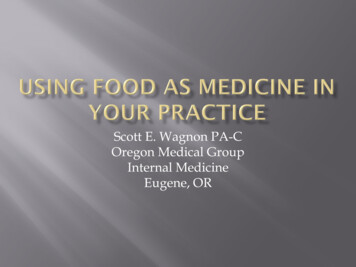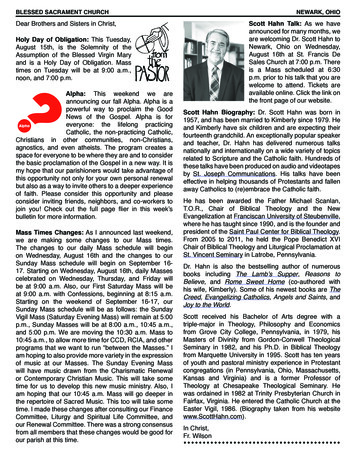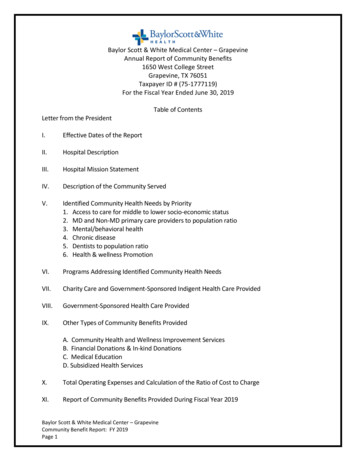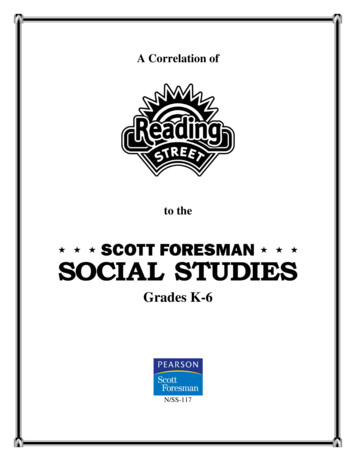
Transcription
Scott E. Wagnon PA-COregon Medical GroupInternal MedicineEugene, OR
Dictionary: The state of being free from illnessor injury.“Good health is a way to get more out of yourlife-more energy, more enjoyment, morepotential, more purpose, more life.” (SidneyGarfield M.D. founding Physician of KaiserPermanente)
What we eatHow we deal with stress (emotional resilience)Good sleepLoving relationshipsSocial connectionsPurpose in lifeThe chemicals we use (medications, tobacco,alcohol, drugs, etc.)
Dictionary: The condition of being physicallyfit and healthyIs it possible to be physically fit and not behealthy?
2012: Riding my bicycle 7,000 miles a year andcould easily ride for 7 hours (100 miles a day)multiple days in a rowMost would consider that being physically fit
43 year old maleBMI: 29BP: 138/92Total Cholesterol: 210LDL: 105A1c: 6.2%Daily IBS symptomsOn no medications
What did I do? Studied Nutrition Why did I start there? Felt like I slept wellCope fine with stressGood marriage, family life, careerNot on medication, no tobacco, drugs, onlyoccasional alcohol, and plenty of exercise
Graduate level nutrition textbooksMedline search of the peer reviewed nutritionstudies and articlesLarger nutrition studies Harvard Nurses Health StudyEPIC StudyAdventist Health Study 1&2China Study/Project (Population Study)Lifestyle Heart Trial (RCT) (Dean Ornish)Longitudinal Study (20 years) on reversing heartdisease (Caldwell Esselstyn Jr. M.D.)
Food is personal Food is Mom, Grandma, culture, social, religion,comfort, memories, feelings, emotions Nutrition is a science, and science is not personal itis what it is “Science is defined by the scientific method; it’s anunbiased search for truth and a willingness to beproved wrong.” (T. Colin Campbell phD from hisbook titled, “Whole”)
First we must discuss two ParadigmsReductionismWholism
Looking at single chemicalsSingle nutrientsSingle mechanismsMost often evaluated in RandomizedControlled trials (RCT’s)Good for PharmaceuticalsMany advances in Science as a result
Multiple VariablesThousands of NutrientsThousands of MechanismsEvaluated in Population studies and dietarychange experiments which are weaker levels ofevidence as you get mostly associationsAssociation does not prove causation
But, when these associations are shown overand over, for example when 19 out of 20associations point in the same direction, theyare highly likely to be trueNutrition is a Wholistic science We get more data and information on how thingswork from Reductionist studiesWe get more knowledge and wisdom from Wholisticstudies
Most of the large nutrition studies areWholistic studies (Population studies,Longitudinal, Observational, and Dietarychange experiments)Exception: Lifestyle Heart Trial by Dean OrnishM.D. was an RCT (1990; published in theLancet)
It appears the closer you move toward a morewhole foods plant based diet, the lower are therates of chronic diseaseThe closer you are toward the StandardAmerican Diet (SAD) diet, the more likely youwill have a chronic disease
Whole, unprocessed plant foods VegetablesFruitsBeans, Peas, Chickpeas, Split Peas, LentilsPotato’s, Sweet Potato’sIntact Whole Grains (Rice, Oats, Quinoa, Bulgar, etc.)Nuts and SeedsHerbs and Spices
Meat (Beef, Pork, Chicken, Turkey, Fish, OtherSeafood)Processed Meats (Lunch Meat, Hotdogs, Bacon,Pepperoni)Dairy Products (Milk, Cheese, Yogurt, Butter, SourCream, Cottage Cheese)Processed Foods (Chips, Cookies, Pretzels,Crackers, Donuts, French Fries, Ice Cream, RefinedSugar and Flour Products)Fast FoodSugar sweetened beverages
Yes and NoA Whole Foods Plant Based diet if you arefollowing it 100% is a Vegan Diet but a Vegandiet isn’t necessarily a Whole Foods PlantBased DietMany Vegans eat a lot of processed VeganFoods (Chips, Donuts, French Fries, VeganBacon, Vegan Sausage, Vegan Ice Cream, Lotsof added oil, etc )
Started making changes toward the “PlantBased,” Plant Strong” end of the Spectrumbased on my health goals.Tastes change over timeAfter a year doing this myself, I then startedrecommending it to patients
Whole plant foods are low in calorie densityand high in nutrient density (weight loss)No calorie counting, weighing food, countingcarbs, portion control (don’t have to be hungry)Get all the protein, including all the AminoAcids you needLoaded with vitamins, minerals,phytonutrients, fiber and “good” fatsSustainable way to eat from an environmentalstandpoint
Made by bacteria in the soil Dirt on food, drinking stream water Animals are the “middle man” Is this a problem? Even Omnivores are often deficient secondary toabsorption issues (lack of Intrinsic Factor/PPI’s)Take a supplement (2,500mcg SL per week)
Position statement from the Academy of Nutritionand Dietetics (2016)2015 USDA Dietary Guidelines AdvisoryCommitteeAmerican Diabetes Association (2018)American Association of Clinical Endocrinologists(2018 Guidelines)The American Institute for Cancer ResearchThe dietary guidelines of Sweden, Brazil, Canada,Germany, Qatar, Netherlands, Denmark, Finland,Iceland, and Norway
In 2015 classified processed meats such asbacon, sausage, hot dogs, lunch meats, etc. asClass 1 Carcinogens (Definitely cause Cancer)Which is the same classification as Tobacco,Asbestos and PlutoniumThis was released to the public and medicalprofession at the time. How many of you were aware of this?
In the summer of 2017 the AMA unanimouslypassed a resolution to eliminate processedmeats from all U.S. HospitalsOffer Plant Based meals
Have patients watch the documentary, “ForksOver Knives”There is a new documentary about to come outcalled “The Game Changers”Plant Based Quick Start Guide from thePlantrician ProjectResources list full of websites, cookbooks, otherarticles and free resourcesTeach about Calorie Density and Food LabelReading
Two 30 minute appointments per dayBill for time (99214)Class B Recommendation per the United StatesPreventative Services Task Force (USPSTF)published in the Annals of Internal Medicine,Oct 2014 Covered diagnoses include Diabetes, Pre-Diabetes,Hyperlipidemia, Hypertension Most of our patients , right?
43y/o maleMeds: NoneBP: 140/90Weight: 218lbs (BMI: 29.6)TC: 210 LDL: 105A1c: 6.2%Started moving toward a Whole Foods PlantBased Diet
1 Year LaterMeds: Still NoneBP: 110/60Weight: 172lbs (BMI: 23.3)(-46lbs)TC: 110 (-100pts) LDL: 50 (-55pts)A1c: 4.7% (-1.5pts)Feels Great!!
55y/o MaleType 2 Diabetes, HTN, Obesity andCardiomyopathyMeds: Glipizide, Metformin, Lisinopril, ASA,Carvedilol, Toujeo 300u/mL at 12u qhsBP: 110/70Weight: 226lbs (BMI: 30.7)A1c: 13.8%
6 Months LaterOff Toujeo, Glipizide, and MetforminLisinopril reduced from 40mg to 10mg a dayStill on Carvedilol and ASA forCardiomyopathyBP: 122/82Weight: 206lbs (BMI: 28.0)(-20lbs)A1c: 7.4% (-6.4pts)
64y/o FemaleHTN, Prediabetes, and ObesityMostly wheelchair bound secondary to herweight and bad kneesMeds: Lisinopril, Furosemide, SpironolactoneBP: 160/98Weight: 367lbs (BMI: 59.4)A1c: 5.8%
9 Months LaterNo Med changesBP: 128/84Weight: 328lbs (BMI: 53.1)(-39lbs)A1c: 5.6% (-0.2pts)Feels Great!!Can now stand up and walk around as herknees feel much better
Scott E. Wagnon PA-C Questions? Feel free to Email me sewscott@aol.com
Have patients watch the documentary, “Forks Over Knives” There is a new documentary about to come out called “The Game Changers” Plant Based Quick Start Guide from the Plantrician Project Resources list full of websites, cookbooks, other articles and free res










